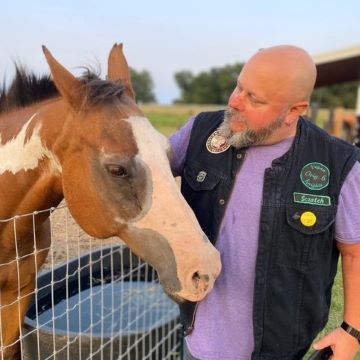
Before we go into the 10 signs you’re addicted to alcohol, it’s important to first understand what alcohol addiction is, and what causes alcoholism.
A person experiencing alcoholism or substance abuse disorder doesn’t have control over when and how much alcohol they drink. This is typically tied with being habitually intoxicated, drinking daily and drinking more alcohol than most.
What Causes Alcoholism?
Alcoholism is classified as an addiction and because of that, there is no single cause. However, alcohol use disorder is something that happens when a person drinks so much or so often that it changes the chemical makeup of the brain.
When consuming alcohol, dopamine levels are raised and the brain categorizes this activity in the same way that a gratifying reward would be.
Over time, this is something people begin to crave. Depending on many factors, such as genes, environment, psychological factors, or stress levels, a person can be more at risk of alcoholism.
10 Signs of Alcohol Addiction
A quick note — if you’re experiencing one of these signs, that doesn’t necessarily mean you have a drinking problem or are experiencing alcoholism or substance abuse disorder. However, if you’re experiencing a few of them (or you see several signs in a loved one), there is a possibility you may need help.
#1: Lying About / Hiding Your Drinking
Hiding how much alcohol you’re drinking or lying about it to others or yourself to make it seem like less of an issue is usually indicative of a problem. This sign is difficult for an outsider to spot, so it requires the person of concern to confront this one on their own.
#2: Drinking to Relax or Feel Better
If you often find yourself having a drink to take the edge off a stressful day or particularly strong emotions like depression, anxiety, etc., it’s a big sign that you’re using alcohol as an emotional crutch. This is a bad habit that can quickly turn into a serious problem.
#3: Loss of Memory / “Blacking Out” Regularly
Simply put, it means drinking too much alcohol. If you often have no memory of what happened while you were consuming alcohol and you’re overconsuming, it might be time to pause and ask yourself why.
#4: You Can’t Stop Once You Start
It’s a sign you aren’t in full control of your drinking if you find that you can’t stop yourself or your “impulse” to drink more once you’ve started. It’s hard for you to put the drink down once you have it. You crave it and find yourself obsessing over it if you try and refrain.
#5: Drinking in Dangerous Situations
Having a strong urge to drink at inappropriate times like before work, before driving somewhere, at your kid’s sports event, etc,. is usually a pretty strong indicator you are not in control of your drinking. Even if something hasn’t gone wrong yet, it likely will if the pattern continues.
#6: Putting Off or Forgetting About Responsibilities
If the reason you are having problems at work, school, or other responsibilities is because of your drinking, then you know alcohol has crossed the line from an occasional indulgence to something that seriously negatively impacts your everyday functioning.
#7: Having Trouble in Your Relationships
Similar to the last point but perhaps more important – if you are having issues with your friends, family, or significant other as a result of your alcohol consumption, this is a big red flag that you have an addiction. It’s an indicator that alcohol is a bigger priority in your life than the people you care about most.
#8: Your Alcohol Tolerance has Significantly Gone Up
Tolerance is another key sign of addiction, so if you can drink more than you used to and need to drink more than you did before in order to get drunk, it’s a strong indicator that you’re becoming an alcoholic. It means your body is exposed to alcohol regularly enough that it has adapted to cope with it better.
#9: Experiencing the effects of Withdrawal
If you start to feel irritable, tired, depressed, nauseous, or anxious when you haven’t had a drink, you might be experiencing withdrawal. Other signs include having trouble sleeping, losing your appetite, and experiencing shakiness or trembling.
It’s important to note that withdrawal can be very serious, leading to other illnesses and in severe cases death. If you think you are experiencing withdrawal, please seek medical assistance.
#10: Trying to Quit but Can’t
At this point, you already have an awareness that alcohol is an issue. If you have tried to quit drinking but you can’t, please consider finding help. When the impulse to drink becomes stronger than your will not to, you are very likely struggling with addiction.
Find out more about alcohol addiction, and what you can do to help yourself or someone you know.
A 2021 poll by The Recovery Village found physical health (61%), mental health (52%), and relationships (47%) to be the most common negative impacts. Drinking also impacted people’s careers, parental abilities, finances, hygiene, and legal status.
It won’t be an easy road ahead, but someday you will be very grateful for putting in the work.
At LifeWorks NW, we help people find the resources they need to learn more about their health concerns, and to get the help they need.
A note on language: while it’s still common to use the word “alcoholic,” at LifeWorks NW we shy away from it. Research shows that the term is associated with a strong negative bias, and our mission is to help people struggling with substance use with compassion and understanding. By using language that emphasizes a person is not their disease, we can help fight against the stigma that keeps so many people from seeking out treatment.
Connect with us today and talk to one of our supportive staff members. We’re here to listen, and to help you get what you need.










